A Marine Diary: My Experiences on Guadalcanal
by
J. R. Garrett
Previous * * * Index
* * * Next
November 1, 1942
(no entry)
November 2, 1942
The battery firing at Japs is the only thing happening around battery.
November 3, 1942
Firing off and on 24 hours a day. Good news from front and infantry.
Lots of rain.
November 4, 1942
25 enemy bombers flew right over us with some Zeros. We got all but
four.
November 5, 1942
Fire missions on the enemy. Just laying around on the hillside starving.
"We never was totally without, but food was scarce and the menu was
very lean. We had sheep tongue from Australia. We'd have sheep tongue for
breakfast, sheep tongue for supper - we only ate two meals a day. One time
it was cold or pickled or something like that, next it would be warm and
with rice. You know in the four months or so I was on Guadalcanal I think
I only had one half slice of bread. The only bread which was on the island
was at the field hospital. And every now and then they would have some
kind of ration bread and we got a couple of loaves of bread for the whole
battery. We would eat Japanese rice - had bugs in it. We took it away from
them, they did without. Hey, we found some five gallon tins of whale fat
that was rolled up in seaweed...looked like banana leaves or something.
They said it was quite a delicacy, but it was just pure fat. And maybe
some of the guys went for it. I don't think I ever managed to eat any for
I found it very distasteful, but I am sure that if I had got hungry enough
I would have."
November 6, 1942
Still firing all the time. They got our range today looks like. Capt.
Bradburry, Sgt. Voelker, Cpl. Strubler got hit. The shell fell to rear
of Number Two gun. They were evacuated.
*All returned to unit.
November 7, 1942
Firing all the time. Today fired 122 rounds. Raining too!
November 8, 1942
Fired 48 rounds. All quiet except for our PT Boats, which could be heard
for miles, attacked and got a Jap destroyer in the Bay. They fired back.
*Much of the Naval action of the previous three months took place in
'Iron Bottom Bay', as we called it, for all the ships that were sunk during
the Battle for Guadalcanal..
November 9, 1942
Drove for Pickard who was sick. Hauled 11,000 rounds to Battalion ammo
dump. 8th Army on way to front to relieve our boys. Three shells hit our
positions. Blew up galley. Lewis' jeep. No one hurt. 318 rounds fired.
November 10, 1942
All quiet except for occasional fire mission and schedule fire. Marine
Corps Birthday.
November 11, 1942
Firing as usual. Hauling the brass to the ammo dump. Two air raids.
12 dive bombers. We got 10 plus two Zeros. High level at 12. 25 come over.
Got eight with AA. Fighters got rest. Heaviest barrage yet.
November 12, 1942
Was given word to pack up and move at 3 o'clock. In rear echelon. Saw
the most unusual sight yet. 16 torpedo planes shot down by 28 ships that
were in the harbor. Big planes being shot down by Grummans and anti-aircraft
fire. Really beautiful.
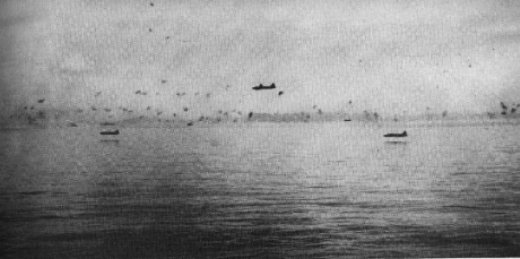
"They flew in low - about 50 feet over the water. I remember we had
30 or 40 or 50 ships sitting in the harbor there. We were on barren hills
on that drive, there was no point so to speak, there was no shade and our
battery position was in a valley...there were 30 or 40 foot grass covered
dunes which you could get on and pretty much have a panoramic view of the
whole bay. I remember seeing a big air raid come in and black anti-aircraft
fire was coming crazy from all the ships in the harbor, all kind of puffs
of smoke hit the sky. In fact there were 16 torpedo bombers come over and
I don't think they hit a thing, they were all being shot down, and I think
one or two got past the fleet. Our planes were after them too. And way
out there on the horizon, we saw the last one go down...all of them were
shot down, we could see the fire and the smoke . These were big two motor
bombers...Japanese bombers burn real good."
|
November 13, 1942
An alert, but P 38's got them eight miles out. Shelling at night and
a naval battle. We come out on top.
* In fact, U.S. Navy ships San Francisco and Atlanta were
in the battle and they took tremendous damage. We lost the the cruiser
Atlanta, the Juneau and seven destroyers. This was the First
Naval Battle of Guadalcanal.
|
November
14, 1942
False air raid alarm. Shelling at one. Fell all around us. No one hurt.
Big naval battle. We lost five ships. Atlanta. Japs are supposed to have
80,000 troops on transports.
* History now tells us that the U.S. and Japanese had the same idea.
For each, it would be a desperate gamble to re-inforce their garrisons.
Both Navies sent large transport ships, loaded with fighting men and
escorted by battleships, cruisers and destroyers. The U.S. had five cruisers,
several destroyers and the carrier Enterprise. The Japanese plan was to
attack Henderson Field with naval shelling by night, destroying the aircraft
on the ground, while landing troops and supplies west of Marine positions.
So the race was on. And on the morning of the 12th, the large number
of ships in the Harbor were ours - the U.S had arrived first with supplies
and reinforcements. But that did not deter the Japanese. They were determined
to reinforce their dwindling garrison.
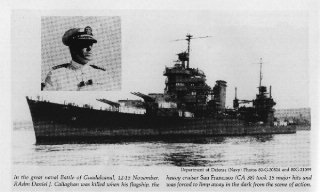
In the early morning hours of November 13th--a Friday-- Admirals Callaghan
and Scott encountered the enemy in the dark as they came down Iron Bottom
Sound. As a result of the American task group attempting to cross the enemy's
'T', the columns ran head-on into each other. A wild melee ensued. In the
confusion of ships running through each other's lines, many were sunk,
some by hits from their own side. Both Admirals were killed and of their
ships, the Atlanta was destroyed and the San
Francisco critically damaged. But they had turned back the Japanese
task force. Of 14 troop transports nearing the island - 10 were sunk.
|
On the night of November 14, the Battleship USS
Washington sank the Kirishima at
the Second Naval
Battle of Guadalcanal.
The unsuccessful naval bombardment of the Marines on Guadalcanal and
the naval battles of the 13th, 14th and the 15th were the final deciding
factors in the defeat of Japan in the Solomons. "Its all over, we are lost"
Admiral
Tanaka told his aide - 'Tanaka the Tenacious'.
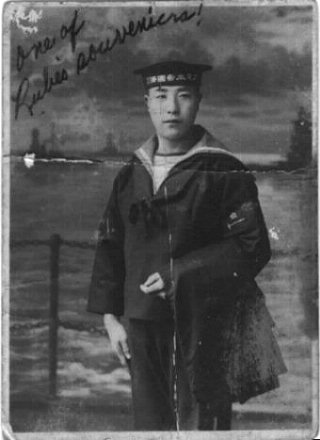
Both sides lost more than 10,000 sailors, most in the bloody 30 minute
naval and air battle off Guadalcanal . The Japanese lost two battleships,
a cruiser, three destroyers and ten Maru transports. They also lost 106
planes. The Americans lost two cruisers and seven destroyers along with
27 aircraft.
The Naval Battles
of Guadalcanal were among the last of the great naval battles in which
warships would attack each other on the surface firing at virtually point
blank range, so close that torpedoes thudded harmlessly off the hulls -
they had no time to arm themselves.
As a result of engagements off Guadalcanal, there are 48 ships on the
bottom at Iron Bottom Sound - 24 of them are American and 24 Japanese.
|
November 15, 1942
All quiet but had a false alarm again.
November 16, 1942
Still quiet again but no enemy planes show up despite condition Red.
November 17, 1942
Standing by to move out on hour's notice.
November 18, 1942
(no entry)
November 19, 1942
(no entry)
November 20, 1942
Got word to move to new position across Lunga. Man are we disappointed.
Big Expectations though.
*We had expected to be evacuated off Guadalcanal at any moment.
November 21, 1942
Moved across Lunga directly behind airfield. All quiet but we are right
in Bomber's Alley.
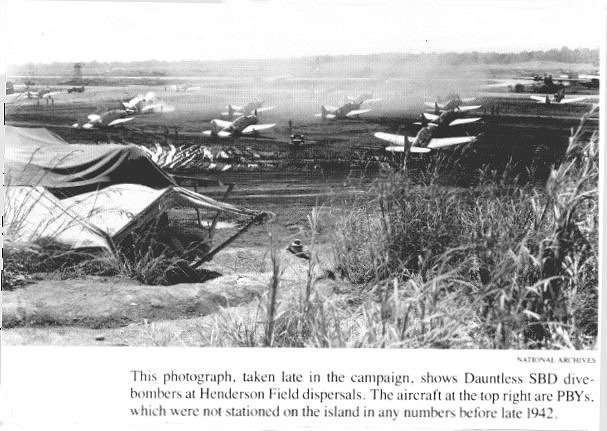
*Bomber's Alley was at the end of Henderson Field and was a primary
target for Japanese air and naval attack.
November 22, 1942
Laying around reading. Sleep and what goes with it.
November 23, 1942
Same.
November 24, 1995
Night bombing. Same.
November 25, 1942
Still quiet except for our 155's and a night bombing. Got 12 men in
G battery - one killed. 25 hit or killed in 7th Marines.
November 26, 1942
Night bombers again but not much damage this time.
November 27, 1942
Marking time. Only 'One Lung Charlie' giving us trouble. Latest dope
says we are leaving, etc.
November 28, 1942
The dope is thick but we never know for sure. Big naval battle.
*Another gun battle off the beach.
A major naval battle off Tassafaronga
Point developed when nine U.S. ships intercepted eight Japanese destroyers
heading to Guadalcanal with reinforcements. The Japanese displayed masterful
night-fighting tactics and their torpedoes struck and sank the cruiser
Northampton and crippled the
cruisers New Orleans and Minneapolis, while losing one destroyer.
The Japanese won a major tactical victory but no reinforcements were landed.
|
November 29, 1942
Tench says we got 28 ships and lost seven. Later, heard officially that
we got 28.
On 29 November, General Vandegrift was handed a message from the
Joint Chiefs of Staff. The crux of it read: "1st MarDiv is to be relieved
without delay ... and will proceed to Australia for rehabilitation and
employment." The word soon spread that the 1st was leaving and where it
was going. Australia was not yet the cherished place it would become in
the division's future, but any place was preferable to Guadalcanal.
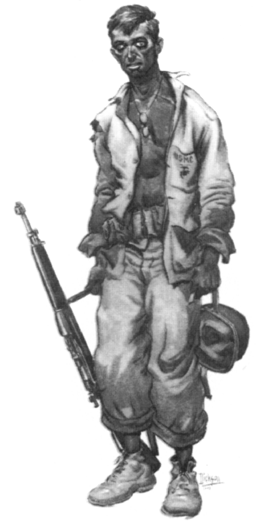 |
National Archives Photo 80-G-34887
---------------------------
As he tells it, "Too Many, Too Close, Too Long," is Donald L. Dickson's
portrait of one of the "little guys, just plain worn out. His stamina and
his spirit stretched beyond human endurance. He has had no real sleep for
a long time ... And he probably hasn't stopped ducking and fighting long
enough to discover that he has malaria. He is going to discover it now,
however. He is through."
--------------------------------------------- Captain Donald L. Dickson,
USMCR |
The men who were leaving were thin, tired, hollow-eyed, and apathetic;
they were young men who had grown old in four months time. They left behind
681 dead in the island's cemetery.
On 7 December, one year after the Japanese attack on Pearl Harbor,
General Vandegrift sent a message to all men under his command in the Guadalcanal
area thanking them for their courage and steadfastness, commending particularly
the pilots and "all who labored and sweated within the lines in all manner
of prodigious and vital tasks." He reminded them all that their "unbelievable
achievements had made 'Guadalcanal' a synonym for death and disaster in
the language of our enemy." On 9 December, he handed over his command to
General Patch and flew out to Australia at the same time the first elements
of the 5th Marines were boarding ship. The 1st, 11th, and 7th Marines would
soon follow together with all the division's supporting units.
Final Statistics
* * *
No entries were made in my diary after that date. However, I recall
we mostly laid around and prepared to leave. We lived a rather quiet life
until we boarded ships and departed Guadalcanal on the USS West Point,
December 16, 1942.
Went to Brisbane, Australia; stayed there about a month and went from
there - because of the extreme change in temperature - to southern Australia,
to Queensland, to Melbourne, and from there we went to Ballarat. We stayed
there eight or nine months. I left the division and returned to the U.S.,
departing Australia July 4, 1943.
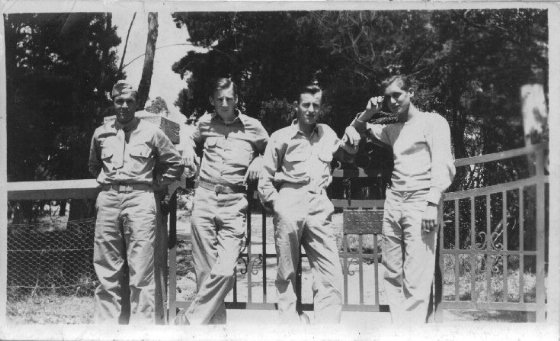 "It was the best of times, it was the worst of times, they were
our days in the sun." (Rube on far right)
"It was the best of times, it was the worst of times, they were
our days in the sun." (Rube on far right)
After nearly four months in the Solomon Islands, and several more in
Australia, I reached the United States on July 23, 1943 - just two weeks
shy of one year since my buddies and I were getting ready to hit the beaches
at Guadalcanal under less than ideal conditions.
I must have picked up the malaria bug somewhere along the way and it
caught up with me in San Diego. After 30 days leave in Geneva, Alabama,
I was stationed as a guard at the Naval Prison in Portsmouth, New Hampshire
where I stayed for a year and a half. A cold climate assignment was about
all they could do for those of us who caught the fever in the South Pacific.
Anyway, from there I returned to Camp Lejeune for reassignment and wound
up the rest of the war in the Panama Canal Zone, stationed at the Coca
Sola Naval Air Base on the Atlantic side or at Colon, Panama. I returned
to Miami for discharge on October 31, 1945.
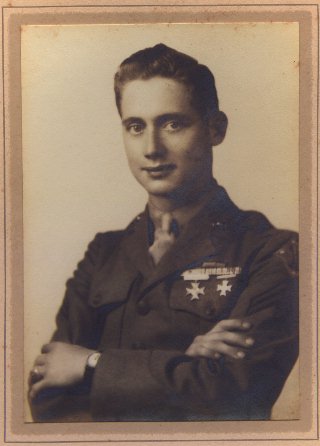 Cpl. J. Rube Garrett, I Battery, 3rd Battalion, 11th Regiment,
1st Marine Division
"War is a terrible thing. I feel like its the highest adventure
a man can have if he survives."
Cpl. J. Rube Garrett, I Battery, 3rd Battalion, 11th Regiment,
1st Marine Division
"War is a terrible thing. I feel like its the highest adventure
a man can have if he survives."
"It was a wonderful experience...it was a terrible experience: the
brotherhood, the adventure. We didn't realize it then but it was like Boy
Scouts. We slept in tents or in holes in the ground (laughs) we'd get up
and they'd holler "food's ready, come and get your chow", 'course they
never had to holler too loud.
A friend of mine, Morrison, made Sergeant. They put him on
forward observer after I left the battery. And he got hit. He said "they
gave me Sergeant stripes because I got wounded". Morrison was a Private
in my battery. Recently, he sent me some pictures of himself in camouflage
fatigues...painted face. He said he'd been playing that combat crap, shooting
paintballs you know? He said "I'm trying to get that combat high we use
to get, but this doesn't quite do it!" In paintball, if you get hit by
a paintball you're dead. But not really...not really."
11/3/95
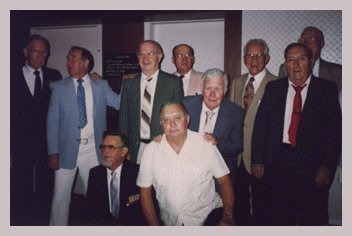 Author and Son
Author and Son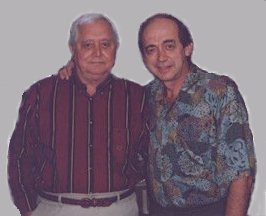
1st Marine Division Reunion of the Foxhole Buddies '90
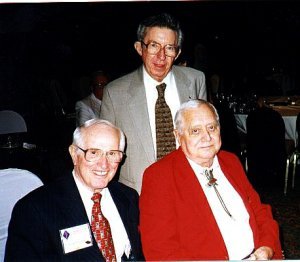 The Edenburg Boys
Four went to war, three came back
The Edenburg Boys
Four went to war, three came back
|
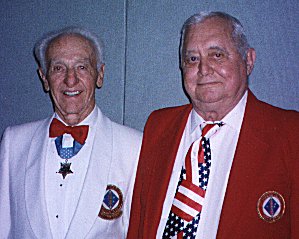 Rube Garrett with Medal of Honor Winner
Mitchel Paige - August, 1996
Rube Garrett with Medal of Honor Winner
Mitchel Paige - August, 1996
|
 Previous * * * Index
* * * Go to Garrett's SkyHole
Previous * * * Index
* * * Go to Garrett's SkyHole







 Author and Son
Author and Son

